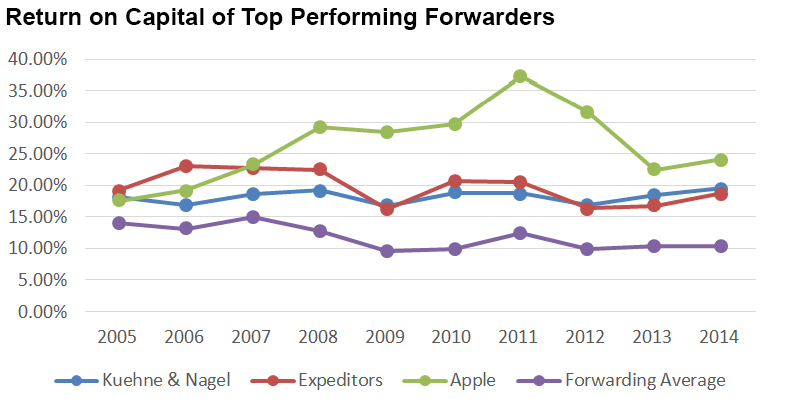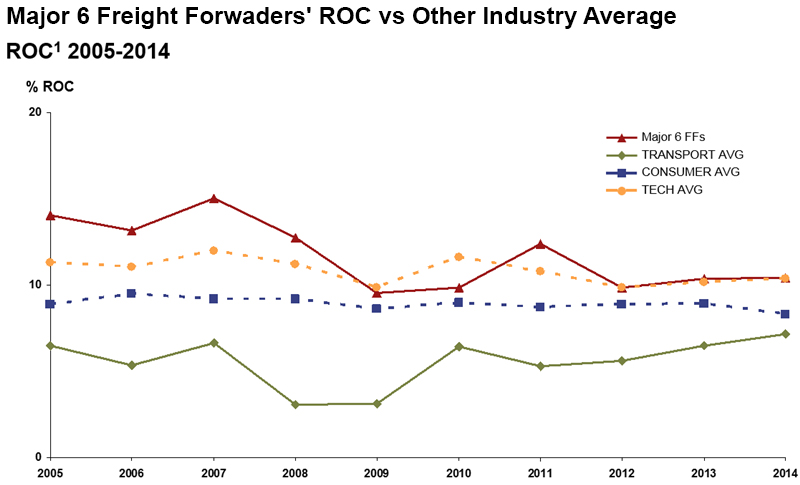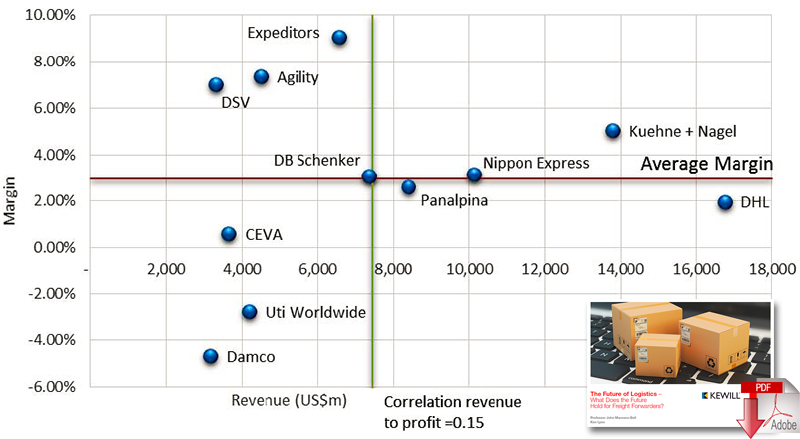How to Succeed In One of the Most Profitable Industries in the World - Freight Forwarding

Freight forwarding is one of the most profitable industries in the world, and its top performers are almost as profitable as Apple, with experience and stable, productive business systems being key differentiators, say analysts.
Freight forwarding doesn’t get the same attention as fast-changing, glamorous industries such as high technology.
Freight forwarding lacks a certain sex appeal - you could almost call its reputation grubby - and thus it’s often overlooked by everyday people, and even by many investors.
Yet freight forwarding is one of the world’s most profitable industries, and its top performers are almost as profitable as Apple (see figure 1).
Another way to demonstrate the industry’s profit potential is to compare the return on capital for the six biggest freight forwarders to the transportation industry as a whole, and also to the high technology and consumer goods industries (see figure 2).
For the past ten years, as the figure shows, freight forwarding is at the top of the heap.
Figure 1

Within the industry, two companies stand out. Swiss-based Kuehne & Nagel and the U.S.-based Expeditors International have for decades boasted profitability levels far above the industry average.
Figure 2

1. ROC data for FF includes K+N, Expeditors, DSV, Panalpina, UTi & CEVA. It doesn’t include DHL & Maersk which are included in the general transportation industry. Other industry average includes top 50 companies in that industry by revenue
Source: S&P Capital IQ
What is the secret to their success? We see two primary reasons: experience and stable, productive business systems.
Experience
Top, middle, and lower management of both companies consists primarily of people with considerable experience in the industry and a long tenure at their company.
For decades, industry titans presided over both companies: Klaus-Michael Kuehne started working at Kuehne & Nagel in 1958 and became CEO in 1966; Peter Rose co-founded Expeditors in 1979 and became CEO in 1988.
Each had a business philosophy that provided a bedrock for his organization’s culture and business systems.
At Kuehne & Nagel, Kuehne has passed on the CEO and Chairman positions to successors, but remains the majority shareholder and honorary chairman. At Expeditors, Rose stepped down as CEO in 2013; his successor Jeffrey S. Musser has worked at the company since 1983.
Keeping experienced people is not a matter of luck but of company policy. For example, Expeditors made no layoffs during the post-2008 recession. It chose long-term employee stability over its short-term balance sheet.
The result of these long tenures is that management and staff have developed a profound understanding of their customers, their suppliers, and their own company. They intuitively know what it takes to convert business into profits.
This knowledge is especially important in the logistics and transportation industry, where customer demands are often complex.
Complex demands arise because customers, seeking to improve their supply chains, present freight forwarders with a huge universe of opportunities to design customized services. Customized value-added services can allow freight forwarders to keep high margins, escaping the sad fate of standardized transportation services, which are increasingly commoditized.
But the key to succeeding at those customized services is the ability to engage existing and potential customers intelligently and ask the right questions.
The best firms are able to match customers’ needs with their own organizational abilities. They know exactly which lever to pull, who to engage, and how to execute in order to convert business into profits. Such skills require experience in the industry and company.
Stable, Productive Business Systems
Industry experience and staff tenure, however, are not sufficient to guarantee top industry performance. Converting activity into profit also requires a proven and well-established business system.
Both companies have proven business systems that are part of the company culture, that all employees accept without any reservation, and that are constantly improved in an organic fashion.
In this context, business systems have two key components:
Clearly Defined Organizational Structures, Processes, and Key Performance Indicators (KPIs)
At Kuehne & Nagel and Expeditors, there are no doubts or discussions about how the company is structured, who the key decision makers are, how business is conducted, or how performance and quality are measured.
Answers to such questions are built into the DNA of these companies. All employees know and accept them. This does not mean that the organizational structures and processes of these companies are static. They certainly evolve over time - but with consideration for the fundamental laws of the freight forwarding business and the internal company culture.
Because these companies have strong cultures and deep industry knowledge, they can better adapt to changing market requirements with intelligent, appropriate evolution of business systems. Indeed, their strengths often allow them to drive change themselves rather than having to react to it.
Data Mastery
Operational excellence, productivity, customer satisfaction, and profit also depend on mastering data. Data mastery should not be confused with the capabilities of an IT system.
Neither Kuehne & Nagel nor Expeditors have a superior IT system. Both use an older in-house solution.
An industry myth holds that IT capabilities differentiate successful freight forwarding companies. Not true: what matters instead is how well companies use their systems. How well do they maintain their master data? How well do they train their users? How well do they maintain their databases, paying attention to entry and management of each data element?
Freight forwarding is a highly detailed business that consists of many thousands or even millions of individual transactions. The better these are processed and managed, the better a company performs.
Many freight forwarding companies fall short in this area.
Read: 6 Rules for Collaborative Global Logistics Contracting
Conclusion
Perhaps one reason that the freight forwarding industry lacks sex appeal is that the determinants of success aren’t any sexier than the day-to-day activities of its employees.
Compared to the flash of high tech or the ubiquity of consumer goods, factors such as experienced management and stable systems rarely make magazine covers. But they work. They generate meaningful profits.
Furthermore, they are transferrable. Although other companies can’t duplicate the history of the freight forwarding front-runners, they can learn lessons from that history in order to achieve profitability in the future.
One key lesson is to invest in experience and stable systems within a strong corporate culture.
Editor’s Note: This exclusive Supply Chain Management Review guest feature is authored by Laurent Guerard, partner, A.T. Kearney; Arsenio Martinez-Simon, principal; A.T. Kearney; Jeff Ward, partner, A.T. Kearney; and Oliver Gritz, independent expert in transport and logistics with more than 30 years of industry experience.
Image: Avron Logistics
Related: What Does the Future Hold for Freight Forwarders?

Freight Forwarder Revenues and Margins
Despite very similar business models, the diversity in levels of profitability between companies is remarkable. The chart below shows the considerable variance between best-in-class profitability and those forwarders performing least well. It is also evident that scale is no guarantee of profitability. Some small players have very good margins, but at the same time, some make big losses.

Download: The Future of Logistics – What Does the Future Hold for Freight Forwarders?
Article Topics
Expeditors News & Resources
How to Succeed In One of the Most Profitable Industries in the World - Freight Forwarding Unpacking Risk Shifting Shifting Risk and Meeting in the Middle Might Be Key to Shipper & Third-Party Logistics Relations 6 Rules for Collaborative Global Logistics ContractingLatest in Transportation
Baltimore Bridge Collapse: Impact on Freight Navigating Amazon Logistics’ Growth Shakes Up Shipping Industry in 2023 Nissan Channels Tesla With Its Latest Manufacturing Process Why are Diesel Prices Climbing Back Over $4 a Gallon? Luxury Car Brands in Limbo After Chinese Company Violates Labor Laws The Three Biggest Challenges Facing Shippers and Carriers in 2024 Supply Chain Stability Index: “Tremendous Improvement” in 2023 More Transportation












